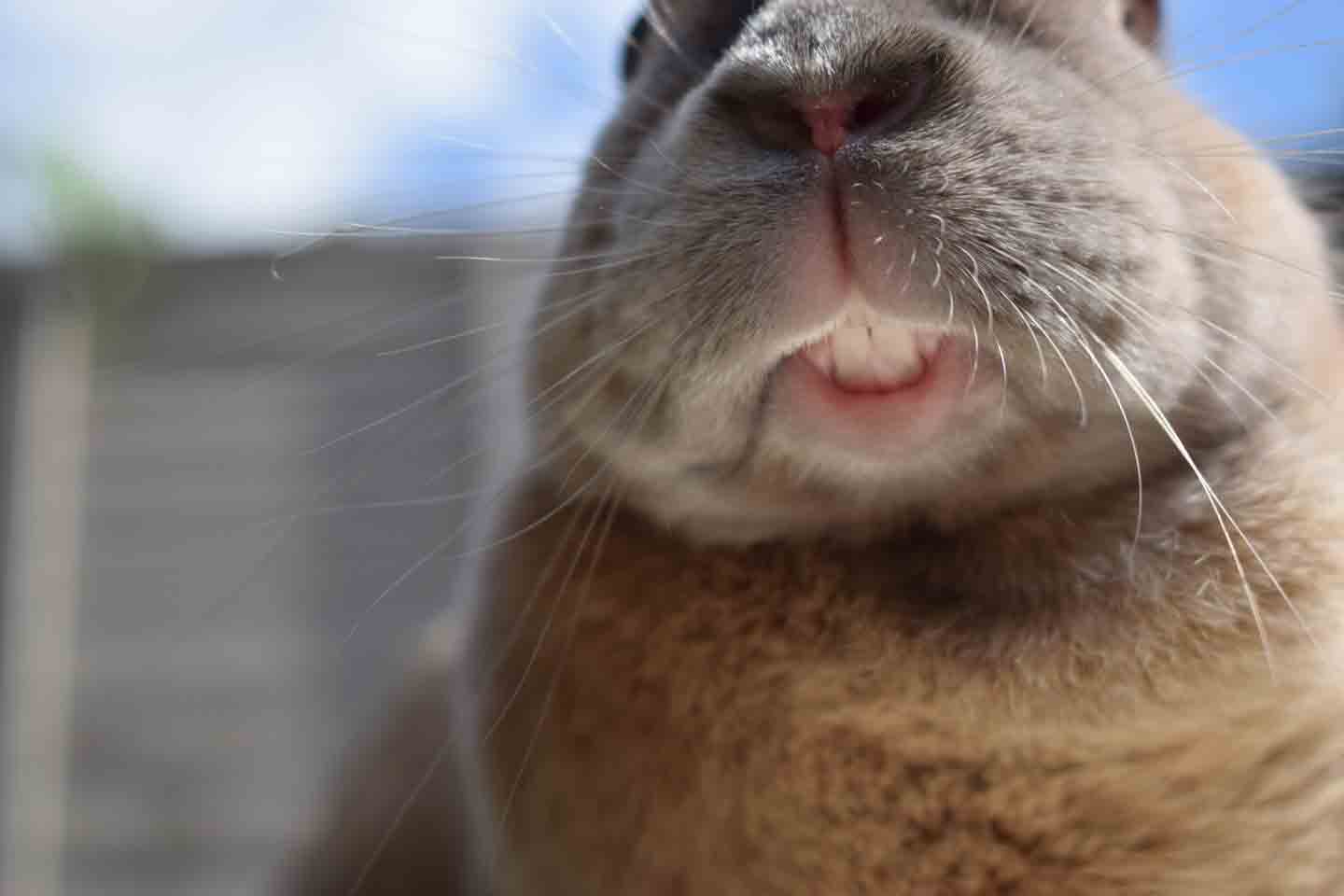In This Guide
What Makes Rabbit Teeth So Special?
Unlike the teeth of cats, dogs or even humans, rabbit teeth are “open rooted,” meaning they grow continuously throughout a rabbit’s life at a rate of about 2-3 mm per week. In that sense, they’re more akin to fingernails or claws that continue growing and require maintenance.
This unique nature of rabbit teeth means that pet parents must ensure their bunny’s teeth are consistently being worn down. “The way that they wear them down is by eating fibrous foods, like hay,” explains Laurie Hess, DVM, veterinarian and owner of Veterinary Center for Birds & Exotics in Bedford Hills, New York.
Because of this non-stop growth, Dr. Hess notes that hay is the number one most important thing for bunnies to eat. If they don’t eat hay, the top and bottom teeth continue to grow unchecked, and they can hit each other, deform the mouth and form sharp edges, she explains.
Chew toys, such as wooden blocks, branch sticks and tough grass balls, can additionally help promote natural wear of their teeth, though these are not a substitute for hay.

How Many Teeth Do Rabbits Have?
There are typically 28 teeth inside of a rabbit’s mouth. This includes the following:
- 4 incisors: These are their big top and bottom front teeth, which are used for cutting through tough vegetation.
- 2 peg teeth: These are small teeth directly behind the incisor teeth.
- 6 upper and 4 lower premolars: Premolars help grind and chew a rabbit’s fibrous diet for easier digestion.
- 6 upper molars and 6 lower molars: These are found on each side of a rabbit’s jaw, and also help grind and chew their food before swallowing.
Why Are Rabbits’ Teeth So Big?
Along with having teeth that are continuously growing, you might have noticed that rabbit teeth are also quite large! (They have even earned the moniker “buck teeth.”) That’s definitely by design.
Rabbits have large teeth to accommodate their herbivore diet, which is full of fibrous foods that require some pretty serious chompers. The front incisors help cut through tough vegetation, while the premolars and molars located toward the back of their mouth help break down the tough, coarse grasses and other vegetation.
All that’s to say that without their big teeth and ongoing growth, both wild and pet rabbits would struggle to consume and digest their natural diets safely.
Common Rabbit Dental Problems
Rabbits can experience a range of dental problems, often related to the fact that they have continuously growing teeth. These include misalignment, malocclusion, overgrowth (tooth root elongation), tooth root abscess, dental disease and broken teeth.
Signs of Dental Issues in Rabbits
Here are some symptoms rabbit keepers should look out for when it comes to their pet’s dental health.
- Sores: “If their top and bottom teeth don’t wear properly, they will often form little sharp points at the edges of the teeth that can poke into their cheeks and into their tongue, causing little lacerations and sores,” Dr. Hess explains.
- Abscesses: Sores related to overgrown teeth can also become infected, leading to abscesses in the mouth.
- Stinky breath: This can be linked to infections of the teeth or mouth. This might be noted before your rabbit is showing any other signs or teeth/mouth issues.
- Behavioral changes: When rabbits experience dental issues, they can exhibit signs such as lethargy, decreased grooming, low mood, irritability and aggression.
- Changes in eating: If there’s pain when a rabbit chews, they are less apt to eat the same way they used to. They may eat less, or only eat foods that are soft (which isn’t good for their digestion). Also, look for them dropping food. Dr. Hess says, “This is where rabbits seem really hungry, and they go to pick up their food and they try to chew, and it falls out of their mouth.”
- Stool changes: Changes in diet can impact the way your rabbit’s poop looks. Healthy rabbit poop should generally be round, firm and uniform in size—resembling small, dry pellets. If it’s soft or slimy, this is a sign something’s up.
- Weight loss: Decreased food consumption can lead to weight loss, as well.
- Drooling: Rabbits rarely drool (this is more common in guinea pigs), but it could be a sign that something’s not right with their dental health.
- Grinding/clicking: Tooth grinding or audible clicking sounds when chewing indicate discomfort.
How To Care for Your Rabbit’s Teeth
The most important thing you can do to ensure good dental care for your rabbit is provide them with consistent access to fibrous hay (long fibers adding “scratch factor” to stimulate digestion). This is essential not only to their digestion, but also ensures their teeth are ground down as needed. Approved chew toys are supplementary, but can be helpful.
Dr. Hess also stresses the importance of taking your rabbit to the vet for an annual checkup and as needed for any potential issues. This allows them to identify and address any health issues via a physical exam of their body, mouth, and jaw bones and to take any necessary X-rays. (They can even X-ray your rabbit’s mouth!)
FAQs About Bunny Teeth
Q:
How should rabbit teeth look?
Q:
How can I tell if my rabbit’s teeth are too long?
Q:
How do you trim overgrown rabbit teeth at home?
Make sure you’re giving your bunny the special care they need to ensure a long and happy life. Learn more about how rabbits eat.
Expert input provided by Laurie Hess, DVM, veterinarian and owner of Veterinary Center for Birds & Exotics in Bedford Hills, New York.
This content was medically reviewed by Chewy vets.
The post Bunny Teeth: A Guide to Your Rabbit’s Chompers appeared first on BeChewy.


